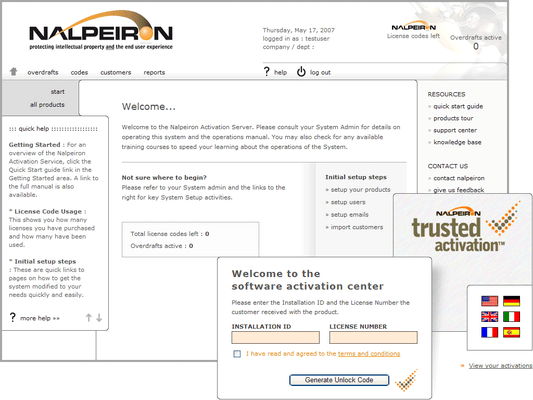Nalpeiron Licensing Crack

What are users saying about Nalpeiron Licensing Service? Read real Nalpeiron Licensing Service reviews, pricing information and what features it offers. In this case study Linn Software show how the Nalpeiron Licensing system can be used to solve complex licensing issues and drive a range of business benefits. Linnsoft make market. With each software license locked to an individual machine Linnsoft's product is now much more crack resistant. But there have been. Apr 23, 2015 - Second, our copy protection provider Nalpeiron has informed us that as of this year, they are more than tripling their annual fee to $5000 (not including per-license fees), which is much more than we earn from sales of AdrenaLinn Sync. So I give up. If you own a license for AdrenaLinn Sync, your existing. Thibault Lemaitre, working at Nalpeiron.com (Software License Management). Answered Aug 20, 2015. If you're talking about OS X apps VS Windows apps, you. We have had to make our Windows product harder to crack than our Mac one. We know that 'cracked' versions are out there, but this isn't hurting Mac sales as.
This article includes a, but its sources remain unclear because it has insufficient. Please help to this article by more precise citations. (May 2009) () () Copy protection, also known as content protection, copy prevention and copy restriction, is any effort designed to prevent the reproduction of software, films, music, and other media, usually for. Various methods have been devised to prevent reproduction so that companies will gain benefit from each person who obtains an authorized copy of their product.
Unauthorized copying and distribution accounted for $2.4 billion in lost revenue in the United States alone in the 1990s, and is assumed to be causing impact on revenues in the and the, leading to proposal of stricter copyright laws such as. Some methods of copy protection have also led to criticisms because it caused inconvenience for honest consumers, or it secretly installed additional or unwanted software to detect copying activities on the consumer's computer. Making copy protection effective while protecting consumer rights is still an ongoing problem with media publication. This section needs expansion. You can help. (November 2015) Media corporations have always used the term copy protection, but critics argue that the term tends to sway the public into identifying with the publishers, who favor restriction technologies, rather than with the users. Copy prevention and copy control may be more neutral terms.

'Copy protection' is a misnomer for some systems, because any number of copies can be made from an original and all of these copies will work, but only in one computer, or only with one, or only with another device that cannot be easily copied. The term is also often related to, and confused with, the concept of. Digital rights management is a more general term because it includes all sorts of management of works, including copy restrictions. Copy protection may include measures that are not digital. A more appropriate term may be 'technological protection measures' (TPMs), which is often defined as the use of technological tools in order to restrict the use or access to a work. Business rationale [ ] Copy protection is most commonly found on, DVDs, computer software discs, video game discs and cartridges, audio CDs and some. Streaming Megaman Nt Warrior Ita. Many media formats are easy to copy using a machine, allowing consumers to distribute copies to their friends, a practice known as 'casual copying'.
Companies publish works under copyright protection because they believe that the cost of implementing the copy protection will be less than the revenue produced by consumers who buy the product instead of acquiring it through casually copied media. Opponents of copy protection argue that people who obtain free copies only use what they can get for free, and would not purchase their own copy if they were unable to obtain a free copy. Some even argue that free copies increase profit; people who receive a free copy of a music CD may then go and buy more of that band's music, which they would not have done otherwise. Some publishers have avoided copy-protecting their products, on the theory that the resulting inconvenience to their users outweighs any benefit of frustrating 'casual copying'. From the perspective of the end user, copy protection is always a cost. And license managers sometimes fail, are inconvenient to use, and may not afford the user all of the of the product he has purchased. The term copy protection refers to the technology used to attempt to frustrate copying, and not to the legal remedies available to publishers or authors whose copyrights are violated.